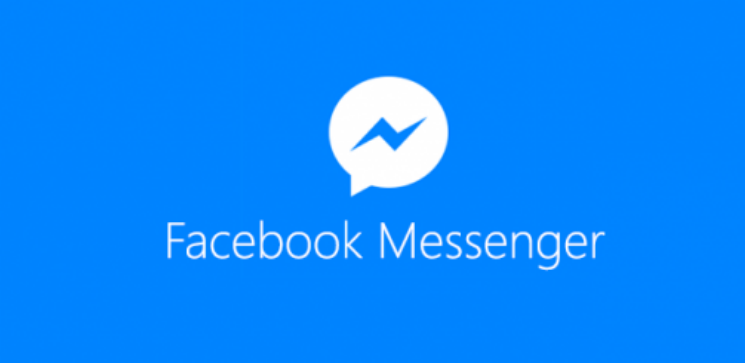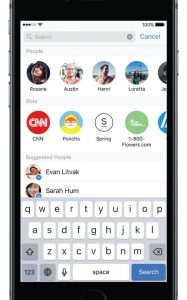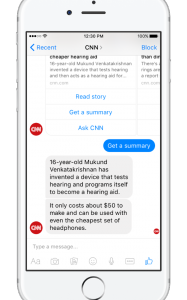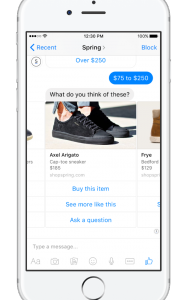- February 7, 2017
- by Alex Song
Education in the US Could Change Drastically
- February 2, 2017
- by Alex Song
The Obamas on a Much Needed Vacation
- January 16, 2017
- by Alex Song
Netflix Stock Stronger Than Ever
Facebook Messenger Launches New System of Targeted Advertisements

- Apr 13, 2016
- by Alex Song
It was considered a mild annoyance when Facebook decided to split their messaging service from their main app. It just seemed like a way to take up extra space on our phones and a new thing to sign into, but today it is one of the most popular messaging apps in the world with over 900 million users, second only to Whatsapp. The app has become so popular that many people use it as their main messaging app instead of the native messaging app that is pre-installed on their smartphones. With it’s popularity, it’s understandable that Facebook would want to monetize with ads. Of course Facebook is true to their word and tries very hard to keep ads to a minimum even on their main website. So then, how does Facebook go about making money off messenger? The short answer is bots.
What is a bot?
For those that remember old chatrooms and instant messaging clients like AIM (AOL Instant Messaging) or MSN Messenger there used to be semi artificial intelligence programs that would appear just like a contact or friend would on your list. You could message them and interact with them just like you would a real person and even ask them to do things for you like calculate something. They were a bit crude compared to today’s soft AI. Today, we have mighty digital assistants like Siri, Google Now and Cortana. They are built into our phones and with the right settings we can practically use our phones without even touching them. Chief executive Satya Nadella described the new wave of smart apps, “Human language is the new user interface, bots are like apps and digital assistants are like meta apps, or the new browsers. Intelligence is infused into all of your apps.”
How is a bot an AD?
Facebook’s head of Messenger is actually Paypal’s former president, David Marcus. When he was brought along, he has a vision that would completely change the way we purchase and interact with companies. Instead of having ADs and going to a website to add to a cart and checkout, Marcus wanted the entire exchange to feel more like a conversation. The launch of bots in Facebook is the culmination of that thought process and perhaps the beginning of a change in online purchasing. The bots will be available to everyone and would act much like a digital assistant. You can talk to them and ask them to do things for you. So far, that just sounds helpful. The sneaky thing is that the bots will learn more about you the more you use them. They’ll learn your preferences, your likes and dislikes which are all gold for data miners who then use that to target ADs to you. Eventually, Facebook will use the information the bots get from you and may even let advertisers contact you directly via the Messenger app if they think you’ll be open to it.
How would bots actually work?
Facebook is not hiding anything from us, and they’re definitely not trying to trick us. The bots would likely be in a separate category and just about any developer can make a bot. Facebook claims that instead of just a traditional question and answer bot, the bots on FB Messenger would have a much more rich thread of responses, more similarly to an actual conversation.
For instance, the CNN bot could be used to sift through news that is more relevant to you much more quickly. You can ask it specific questions and it will give you results and even summaries of news that is catered to you instead of just browsing through all the news stories.
Other bots would be targeted toward online commerce. The shopping bot from Spring would ask you for some input parameters like what you’re looking for and price range. Then it would spit out a few curated options based on what it knows about you. “It’s completely automated. People at the Facebook office here have been playing it here for the last couple of days, spending way too much money on it,” Marcus said.
Facebook isn’t the only one.
With so many other prolific messaging players it would make sense that Facebook isn’t the only company to have bots. Microsoft recently announced that they would integrate bots into Skype. “A thread of conversation is a much better form of app, Marcus says. A Messenger chat retains your identity, the context of your previous conversations and always follows on logically from your last message. For those that are worried about irreparable harm to your credit , you can change or cancel an order just like you could with an app. Marcus poignantly said, “Maybe it’s the beginning of a brand new era – there was web, then mobile, apps and now bots. It is an incredibly powerful paradigm shift.” Perhaps the new standard for online commerce and indeed all future apps will be drawn from the bot or conversation structure. Like the rise of the apps, the rise of the bots will most likely prove to be a profound change in how we live our lives.
CATEGORIES
- Breaking News(21)
- Buzz+(54)
- Life+(19)
- Most Read Stories+(13)
- Science+(15)
- Uncategorized(2)
- Video+(3)










Latest Comments